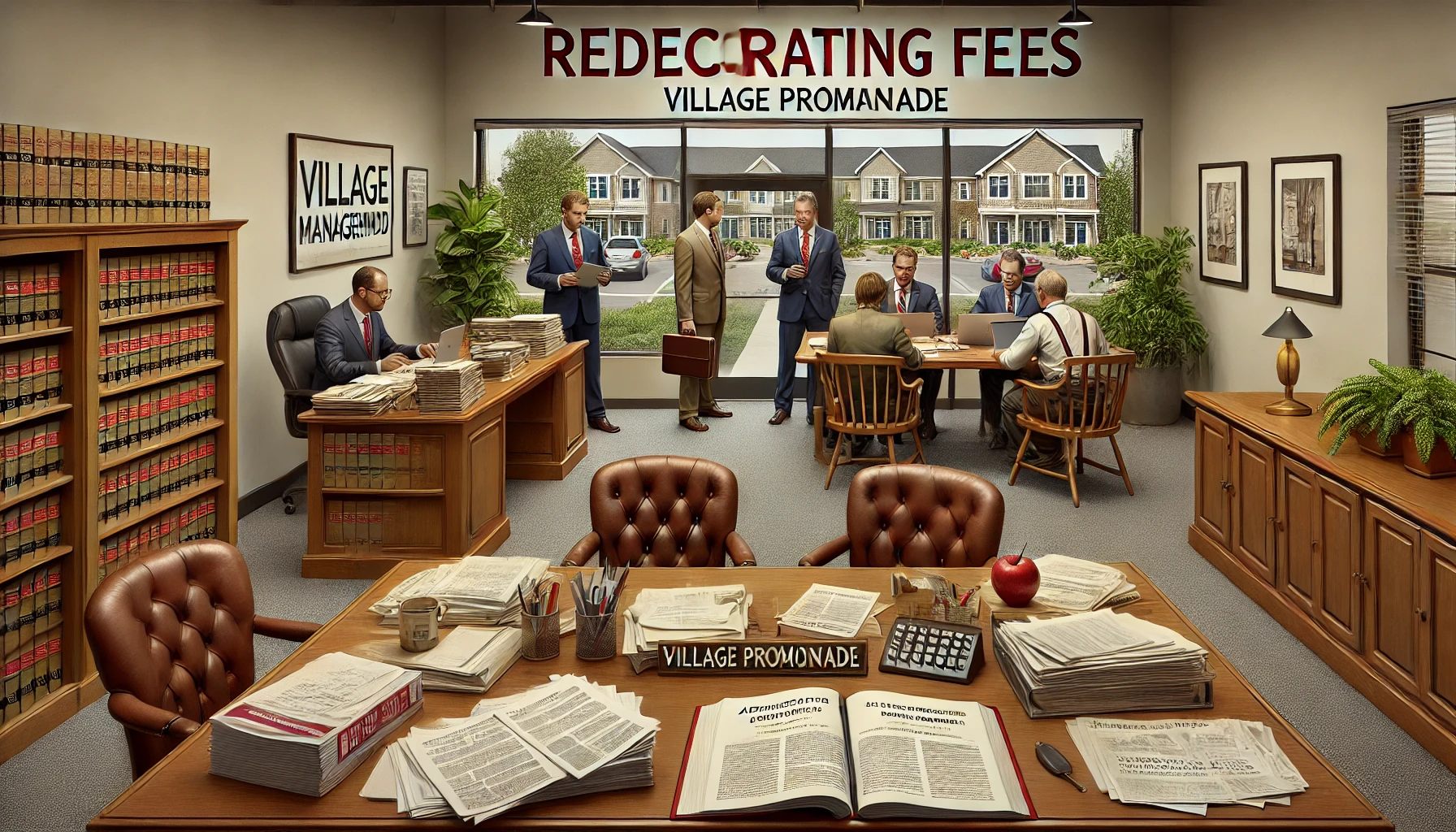The Village Promenade Muncie Indiana lawsuit over redecorating fees has sparked significant attention, shedding light on disputes between property management and tenants. This case has raised questions about tenant rights and landlord obligations in rental agreements.
At the heart of the lawsuit is the controversy surrounding fees imposed on tenants for redecorating common areas. Many residents argue that these charges were unexpected and unfairly implemented, leading to legal action.
This legal battle highlights broader issues in rental housing, including transparency in fee disclosures and the balance of power between landlords and tenants. The outcome of the Village Promenade Muncie Indiana lawsuit over redecorating fees could have far-reaching implications for similar disputes in the future.
What Led to the Village Promenade Muncie Indiana Lawsuit Over Redecorating Fees?
The Village Promenade Muncie Indiana lawsuit over redecorating fees stemmed from unexpected charges imposed on tenants for updates to communal spaces. These fees were reportedly added without clear prior notification or tenant agreement.
Residents claim that the property management made decisions about redecorating without consulting those who would ultimately bear the financial burden. This led to dissatisfaction and formal complaints by multiple tenants.
One critical factor fueling the lawsuit was the perceived lack of transparency in the lease agreements. Tenants argued that redecorating costs were neither outlined nor justified in the terms they signed.
The escalation occurred when attempts to mediate the issue informally failed, leaving tenants with little choice but to seek legal recourse. This lawsuit has become a pivotal example of disputes over hidden or ambiguous fees in housing agreements.
Factors Contributing to the Lawsuit:
- Unanticipated charges for redecorating common areas.
- Lack of tenant consultation during decision-making.
- Opaque fee structures in leasing contracts.
Key Details of the Village Promenade Muncie Indiana Lawsuit Over Redecorating Fees
The Village Promenade Muncie Indiana lawsuit over redecorating fees centers on alleged violations of tenant rights and lease terms. Tenants contend that the fees were unfairly imposed and not explicitly stated in their agreements.
The lawsuit identifies several areas of concern, including the nature and scope of the redecorating projects. Tenants argue that these upgrades were cosmetic and did not directly enhance their living conditions.
A timeline of events reveals that the issue gained momentum after residents received fee notices for redecorating projects completed months prior. Many tenants felt blindsided by these retroactive charges.
| Key Aspects | Details |
| Fee Type | Charges for redecorating common areas |
| Resident Complaints | Lack of notice, hidden charges |
| Legal Claims | Breach of lease terms |
The property management has countered by asserting that the redecorating efforts were necessary to maintain community standards. However, tenants argue that the management failed to adequately justify the expenses or follow contractual obligations.
How Tenants Are Affected by the Village Promenade Muncie Indiana Lawsuit
Tenants at the Village Promenade have faced financial and emotional strain due to the ongoing lawsuit. Many residents have expressed frustration over the lack of clarity regarding the charges.
The unexpected costs have disrupted monthly budgets for several tenants, some of whom are students and young professionals. This has created a financial burden that many claim could have been avoided with proper communication.
The lawsuit has also impacted tenant trust in the property management. Concerns about future charges and lease violations have made some residents hesitant to renew their leases.
In addition to financial strain, the legal proceedings have created a sense of uncertainty. Residents are unsure of the potential outcomes, including whether they will receive refunds or if future costs will be addressed transparently.
The case underscores the importance of tenant advocacy and awareness of legal protections in disputes like the Village Promenade Muncie Indiana lawsuit over redecorating fees.
Legal Perspective on the Village Promenade Muncie Indiana Lawsuit Over Redecorating Fees
Legal experts highlight several critical aspects of the Village Promenade Muncie Indiana lawsuit over redecorating fees, particularly the enforcement of lease agreements and disclosure requirements.
At the core of the legal argument is whether the redecorating fees were permissible under Indiana’s landlord-tenant laws. The outcome will likely hinge on the clarity of the original lease terms and whether the fees were explicitly outlined.
Legal precedent in similar cases shows that landlords can face challenges when imposing unplanned fees, especially if they fail to provide adequate notice or violate existing contracts.
Legal Considerations:
- Contractual Obligations: Were the fees disclosed in the lease?
- Notice and Consent: Did tenants receive advance notification of the charges?
- Proportionality: Were the fees reasonable in relation to the redecorating efforts?
The case could set a precedent for how disputes over hidden fees are handled in Indiana. Legal analysts suggest that landlords may need to revise lease agreements to avoid similar conflicts in the future.
This lawsuit illustrates the need for both tenants and landlords to ensure clarity and fairness in leasing contracts to prevent legal disputes.
The Origin of Disputes Over Redecorating Fees at Village Promenade
The controversy around redecorating fees at Village Promenade in Muncie, Indiana, began when tenants received notices about additional charges for upgrades to communal areas. These fees were not explicitly stated in the initial lease agreements, leading to tenant dissatisfaction.
Residents argued that the redecorating projects were non-essential and cosmetic rather than necessary for maintaining safety or functionality. They believed the property management should have consulted tenants before initiating these projects.
The lack of communication about these decisions was a major point of contention. Many tenants felt blindsided by the fees, which they claimed were imposed retroactively without proper notice.
Tensions escalated as tenants voiced concerns about their financial liability for the upgrades. Multiple complaints highlighted the unclear process for determining which expenses were passed on to tenants.
This issue underscores the importance of transparency in lease agreements and tenant communication. The Village Promenade Muncie Indiana lawsuit over redecorating fees serves as a cautionary tale for landlords and property managers.
Understanding Tenant Rights in Cases Like the Village Promenade Dispute
Tenant rights are at the core of the Village Promenade Muncie Indiana lawsuit over redecorating fees, as the case raises questions about fair practices in rental agreements. Tenants are entitled to clear and transparent leasing terms, including fee disclosures.
In disputes like this, tenants often argue that landlords must adhere to the terms specified in the lease. If redecorating fees are not explicitly mentioned, imposing such costs may be considered a breach of contract.
Indiana state laws protect tenants against arbitrary or hidden charges. Landlords are typically required to provide advance notice and justification for any additional fees or changes to lease terms.
Key Tenant Rights:
- Right to clear disclosure of all charges in the lease.
- Protection against unexpected or retroactive fees.
- Access to legal recourse in cases of unfair practices.
The Village Promenade Muncie Indiana lawsuit over redecorating fees highlights the need for tenants to review lease agreements carefully and seek legal advice if they believe their rights are violated.
Financial Impacts of Lawsuits Involving Residential Complexes
The Village Promenade Muncie Indiana lawsuit over redecorating fees has financial repercussions for both tenants and property management. For tenants, the unexpected fees created immediate budgetary stress, especially for students and young professionals.
The lawsuit has also led to legal expenses for both parties, adding to the financial strain. While tenants hope for refunds or resolution, property management faces potential revenue losses from tenant dissatisfaction and increased vacancy rates.
| Financial Impacts | Tenants | Property Management |
| Direct Costs | Unexpected fees, legal expenses | Legal fees, potential settlements |
| Indirect Effects | Stress disrupted budgets | Tenant turnover, reputation damage |
Beyond the immediate costs, lawsuits like this can affect a property’s long-term viability. Negative publicity may deter prospective tenants, while increased legal scrutiny could lead to tighter regulations.
This case serves as a reminder for landlords to balance financial goals with fair and transparent practices to maintain trust with tenants.
Steps Taken to Resolve the Village Promenade Fee Disagreement
Efforts to resolve the Village Promenade Muncie Indiana lawsuit over redecorating fees have included mediation and legal proceedings. Both sides have sought to address the dispute, but finding common ground has proven challenging.
Initially, tenants voiced their concerns through formal complaints to property management, requesting fee waivers or detailed justifications. When these efforts failed, the matter escalated to a lawsuit.
The property management company has defended its actions, stating that the fees were necessary to maintain the aesthetic and functionality of communal spaces. However, tenants have argued that these costs were not part of the original leasing agreement.
Actions Taken So Far:
- Tenant Actions: Complaints, petitions, and seeking legal representation.
- Management Response: Provide explanations and defend fee policies in court.
Some progress has been made through mediation sessions aimed at reaching a compromise. Tenants have requested refunds or fee reductions, while management has explored revising future lease agreements to prevent similar disputes.
The outcome of the case will likely influence how property management companies handle fee disclosures and tenant communications moving forward.
How Lease Agreements Play a Role in Redecorating Fee Disputes
Lease agreements are central to the Village Promenade Muncie Indiana lawsuit over redecorating fees, as they define the financial obligations of both tenants and landlords. Clear terms in the agreement are critical to avoiding disputes.
In this case, tenants argue that the lease did not mention redecorating fees, making the charges unexpected and unwarranted. This lack of transparency became the basis for legal action.
A well-crafted lease should explicitly outline all potential fees, including those for maintenance or aesthetic upgrades to communal areas. Without such details, tenants may rightfully contest charges that seem arbitrary.
Courts often examine lease agreements to determine whether landlords violated contractual terms. In the Village Promenade Muncie Indiana lawsuit over redecorating fees, the ambiguity of the lease has become a focal point in legal arguments.
Key Points for Effective Lease Agreements:
- Detailed fee disclosures.
- Clear language to avoid misinterpretation.
- Provisions for tenant consultation on significant changes.
Tenant and Landlord Responsibilities in Similar Legal Conflicts
Both tenants and landlords have distinct responsibilities in disputes like the Village Promenade Muncie Indiana lawsuit over redecorating fees. Tenants must fulfill their lease obligations, including paying agreed-upon fees, while landlords are responsible for providing a clear and fair leasing framework.
Landlords must ensure that lease agreements are transparent and comply with local regulations. They should also communicate any updates or additional charges well in advance.
Tenants, on the other hand, are expected to review lease agreements thoroughly before signing. If they feel that terms are unclear or unfair, they should seek clarification or negotiate adjustments before committing.
Common Responsibilities:
- Landlords: Drafting transparent leases, notifying tenants of changes, and ensuring legal compliance.
- Tenants: Adhering to lease terms, raising concerns promptly, and seeking legal advice if necessary.
In cases like the Village Promenade Muncie Indiana lawsuit, the failure to balance these responsibilities has led to conflict and financial strain for both parties.
A Timeline of the Village Promenade Controversy
The Village Promenade Muncie Indiana lawsuit over redecorating fees unfolded over several months, with key milestones shaping the legal battle.
Initial Fee Notices: Tenants were notified of redecorating fees for communal areas, leading to widespread dissatisfaction.
Tenant Complaints: Multiple residents filed formal complaints, arguing that the fees were not disclosed in their lease agreements.
Failed Negotiations: Attempts to resolve the issue through internal discussions and mediation were unsuccessful.
Legal Action Filed: Tenants initiated a lawsuit, citing breaches of lease terms and unfair practices.
Court Proceedings Begin: Both sides presented their arguments, with tenants focusing on lease ambiguity and landlords defending the necessity of the fees.
This timeline highlights the progression from initial dissatisfaction to legal escalation, demonstrating the importance of proactive conflict resolution in property management.
Lessons for Property Managers from the Village Promenade Lawsuit
The Village Promenade Muncie Indiana lawsuit over redecorating fees offers several valuable lessons for property managers aiming to avoid similar conflicts.
First, transparency in lease agreements is paramount. Clearly outlining all potential fees and the circumstances under which they may be applied can help prevent misunderstandings.
Second, proactive communication with tenants is essential. Consulting residents about significant changes, like redecorating projects, can foster trust and cooperation.
Key Takeaways for Property Managers:
- Provide detailed and transparent lease agreements.
- Engage tenants in discussions about major property changes.
- Ensure legal compliance in all aspects of fee implementation.
By addressing these areas, property managers can build stronger relationships with tenants and reduce the likelihood of legal disputes.
Broader Implications of Redecorating Fee Disputes on Rental Laws
The Village Promenade Muncie Indiana lawsuit over redecorating fees could have far-reaching implications for rental laws and practices, particularly regarding fee disclosures and tenant protections.
This case underscores the need for clear legal standards governing additional charges in rental agreements. Ambiguity in leases can lead to disputes, as seen in this lawsuit.
State legislatures may respond to such controversies by introducing stricter regulations on fee transparency and tenant consultation. Landlords may also face heightened scrutiny in their lease drafting practices.
Potential Changes in Rental Laws:
- Mandatory disclosure of all fees in lease agreements.
- Requirements for advance notice and tenant approval for major expenses.
- Greater penalties for landlords who fail to comply with transparency laws.
The outcome of the Village Promenade Muncie Indiana lawsuit could serve as a benchmark for resolving similar disputes, influencing both state policies and industry practices.
Conclusion
The Village Promenade Muncie Indiana lawsuit over redecorating fees highlights the critical need for transparency and communication in landlord-tenant relationships. The dispute underscores how unclear lease agreements and unexpected fees can lead to significant legal and financial challenges for all parties involved.
This case serves as a reminder for tenants to carefully review lease terms before signing and for landlords to prioritize detailed, transparent agreements. Proactively addressing potential conflicts through open communication can help prevent disputes and foster trust between tenants and property management.
As the lawsuit continues to unfold, it may set important precedents for rental practices and tenant protections. Both landlords and tenants can learn valuable lessons from this case, ensuring future leasing arrangements are fair, clear, and legally sound.




